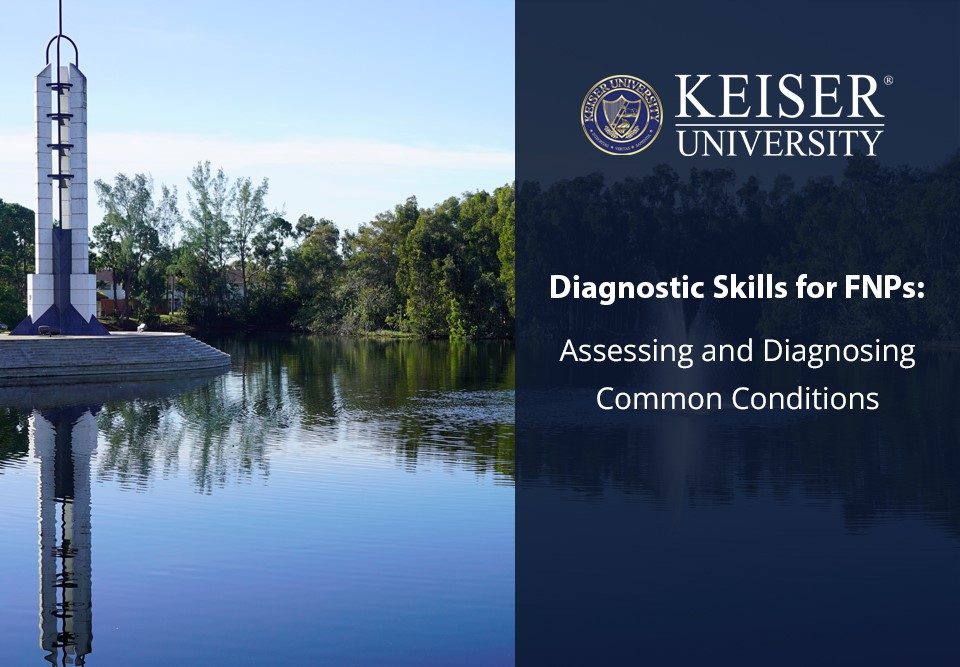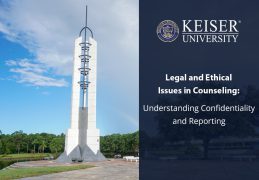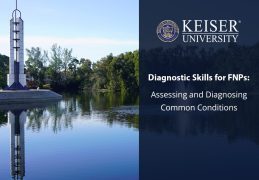As a nurse, you are already accustomed to assessing the condition of your patients and carrying out care plans. However, if you are looking for a nursing role that allows you a little more full authority and responsibility, then it may be time to return to school and become a family nurse practitioner (FNP).
Not only do FNPs have the ability to provide primary care to patients and often prescribe medication, but they also play a critical role in medical assessment and diagnosis of common injuries and ailments.
So, what exactly do aspiring FNPs need to know about diagnostic reasoning and key assessment skills in the medical field?
What Is Diagnostic Assessment?
It can be helpful to begin with a basic definition of diagnostic assessment and diagnostic reasoning, as well as their overall role in the healthcare field. A diagnostic assessment is a clinical evaluation provided by a licensed professional in order to gather information to determine appropriate treatment based on the initial problem presented by the patient. While diagnostic reasoning is a thinking process that leads to the identification of a hypothesis that best explains clinical evidence based on the broad scope of potential contributing factors.
Defining Diagnostic Assessment and Its Significance in Healthcare
Specifically, diagnostic assessment refers to the process of clinically evaluating a patient to determine the most likely cause of the patient’s symptoms. These assessments are critical in healthcare because they are often the first step toward the creation of a viable treatment and patient care plan.
What Is the Purpose of Diagnostic Assessment?
The primary purpose of diagnostic assessment in the medical field is to reach the most accurate patient diagnosis possible. When the diagnostic process is carried out properly in a clinical setting, it is possible to determine the most likely medical conditions or other ailments that may need to be treated and how to treat them effectively.
Role of FNPs in Conducting Patient Assessments
Because FNPs have, depending upon state regulations, the autonomy to assess, diagnose and treat patients suffering from common injuries and ailments, the diagnostic assessment process is used regularly on the job. Specifically, FNPs can use diagnostic procedures to make a medical diagnosis and formulate a treatment plan in-office.
In some cases, an official diagnosis may not be possible until after the results of diagnostic testing come back. In other cases, the presence (or absence) of certain symptoms alone may be enough to make a diagnosis and begin a care plan.
History-Taking, Physical Examinations and Diagnostic Testing
How do FNPs assess and diagnose patients? This can vary from one clinical setting to the next, but most FNPs follow similar standard procedures when conducting a patient assessment. Usually, this begins with a review of the patient’s personal and family history, medical chart assessment and an inventory of symptoms.
From there, FNPs may conduct a physical examination in the office to look for additional symptoms or other noteworthy observations. If necessary, FNPs may also order diagnostic tests or procedures, such as MRIs or ultrasounds, and blood work or other labs, to confirm a diagnosis or rule out other potential causes.
Key Diagnostic Skills for FNPs
If you are thinking about advancing your career as an FNP, there are some key diagnostic skills and techniques you will need to possess to do your job confidently.
Diagnostic Skills Required for FNPs
Having a wide range of diagnostic skills is critical for FNPs, especially when it comes to making the most accurate diagnosis possible.
Clinical Reasoning, Critical Thinking and Differential Diagnosis
With each patient who comes in for treatment, FNPs need to be able to apply critical thinking and reasoning to provide the best plan for care. This should include looking closely at scientific data, research and other information and applying that to each unique patient case.
FNPs must also have a solid understanding of differential diagnosis, where medical professionals can look at a patient who shows symptoms of several medical conditions with similar symptoms. From there, skilled FNPs should be able to differentiate between possible diagnoses to determine the most accurate and likely one.
Techniques for Gathering Patient Information
FNPs also need to be experts at gathering relevant patient data and information so that they can make better informed diagnoses of patient issues and symptoms presented.
Symptom Evaluation, Patient Interviews and Medical History Review
Specifically, FNPs must perform thorough symptom evaluations, where they get to know a patient’s signs and symptoms in-depth. This is often done through a combination of physical examination and patient interviews. Meanwhile, taking the time to thoroughly review a patient’s medical history, charts and relevant family history is a must for reaching an accurate diagnosis.
Importance of Thorough Physical Examinations and Diagnostic Tests
Even with the right patient information and critical assessment skills, FNPs typically cannot make a confident diagnosis without performing a thorough physical examination and diagnostic tests. The specific diagnostics needed to confirm or rule out a medical condition will differ from one patient to the next, but common examples of diagnostic tests that may be performed include:
- Blood work
- X-rays and other scans
- Biopsies
- Urinalysis
- ECG or EKG
Assessing and Diagnosing Common Medical Conditions
Because FNPs are often the first line of care for their patients, there are some common medical conditions they tend to see and diagnose in their offices.
Medical Conditions Encountered in Primary Care Settings
Some examples of common medical conditions FNPs frequently see, diagnose and treat in primary care settings include:
- Allergic reactions
- High blood pressure
- Skin issues (such as rashes and eczema)
- Infections and viruses (related to respiratory and urinary issues)
- Diabetes
- Anxiety and depression
Diagnostic Criteria, Assessment Methods and Differential Diagnoses
With so many potential diagnoses to consider, FNPs must be skilled in performing efficient and accurate medical assessments. This includes using the right diagnostic criteria and assessment methods to reach an accurate diagnosis. To add, this may also consist of producing an efficient treatment plan that takes the patient’s unique needs into careful consideration.
Because the symptoms of several common medical conditions can mimic other ailments, FNPs must also be able to utilize differential diagnoses in their medical assessment. Often, this is a skill that must be sharpened over time.
Utilizing Evidence-Based Practice in Diagnosis
FNPs must also utilize evidence-based practice when reaching a diagnosis in their work, even after careful assessment.
Importance of Evidence-Based Practice in Accurate Diagnoses
What exactly is evidence-based practice in healthcare? This refers to a method that combines a wide range of assessment methods and other techniques to reach the most accurate diagnosis possible. It draws on everything from the FNP’s personal experience and knowledge to collaboration with other healthcare professionals and the most up-to-date diagnostic methods. By utilizing evidence-based practice, FNPs can provide their patients with the highest standard of care possible.
Resources and Tools Available to FNPs
Family nurse practitioners must also learn to utilize the many resources and tools available to them on the job. Specific resources may vary from one facility to the next, but often include:
- Point of care tools
- Medical management tools
- Medication look-up apps
- Medical journals and other publications
Role of Continuing Education and Professional Development
At the end of the day, the most successful FNPs are those who acknowledge and understand that they are never truly done learning and growing professionally. The healthcare field is constantly evolving, with new innovations and best practices being discovered on a seemingly daily basis. FNPs must be committed to continuing education and professional development to best serve their patients and advance in their careers.
Collaborating With Interdisciplinary Healthcare Teams
In addition to being able to perform their own diagnostic assessments, FNPs must also be able to collaborate with other healthcare professionals when necessary to strengthen diagnostics and improve care.
Collaborative Nature of Diagnostic Assessment in Healthcare
It is not uncommon for reaching a diagnosis to require collaboration and input from multiple medical professionals. When an FNP is not completely confident in a patient’s diagnosis, being able to consult with other nurses, doctors and medical professionals can make all the difference.
Effective Communication and Collaboration With Other Healthcare Professionals
Of course, being able to work with other healthcare professionals in diagnostic assessment requires all parties to possess strong communication and collaboration skills. This means being able to share information effectively, whether it be orally or through written communication. They need to be as clear as possible about what the patient’s symptoms and condition are.
Tips for Fostering Collaborative Relationships and Interdisciplinary Teamwork
Fostering collaborative relationships in a medical setting is not always easy, as many FNPs will learn in their early years on the job. At the same time, it is important to your patients’ quality of care that you step outside of your comfort zone and learn to get additional input/opinions from your colleagues before confirming a suspected diagnosis.
Staying in regular contact with other medical professionals in your practice is a great way to build collaborative relationships with others, as is taking part in team-building exercises and similar efforts. At the end of the day, FNPs and other medical professionals can provide the best standard of care when they work together as a team.
Advance Your Nursing Education at Keiser University
Family nurse practitioners play an increasingly important role in providing primary care when it is needed most. This involves performing patient assessments to accurately diagnose and treat medical conditions while often collaborating with other healthcare professionals to provide the highest standard of patient care.
Interested in becoming an FNP? Keiser University’s MSN FNP program is designed to be completed in as little as 18 months with up to 12 transfer credit hours. Plus, this program is offered online, so you can enjoy the flexibility and versatility that you need when fitting graduate school into your busy life.
Find out more about Keiser University’s MSN FNP program by reaching out to a graduate admissions counselor, or get started with your online application today.





